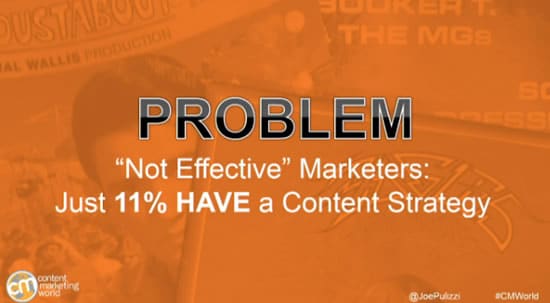Content marketing research, presented at Content Marketing World 2013, shows content strategy challenges and the success of in-person events.

Joe Pulizzi kicked off the first “official” day of Content Marketing World 2013 emphasizing the lack and need of a formal content marketing strategy. In his opening keynote, Joe also presented his new book, ‘Epic content marketing’.
In this post an overview of the key takeaways from the research that Pulizzi announced. Content marketing remains a hot topic and content marketing usage is growing in North America: 93% of B2B marketers say they use content marketing.
In B2C 90% does and in non-profit 92%. It’s probably not a big surprise content marketing spending is growing as well with 60% of respondents planning to increase spending, making content marketing take 30% of the total marketing budget spent. However, do take into account that in the research content marketing tactics are defined in a relatively broad way (including e.g. eNewsletters and blogs).
The increasing role of in-person events in marketing
Looking at the top 5 marketing tactics not a lot has changed. However, there is a significant increase of in-person events. Are we swapping social interaction for real-life contact?
The top 5 of tactics used in content marketing:
- Social media.
- eNewsletters.
- Blogs.
- In-person events.
- Video.
The biggest increases regarding these tactics are for:
- As mentioned, in-person events with three in four respondents leveraging owned, live events.
- Infographics. Indeed, the visual data-driven infographic content format increases 25% in B2B and B2C.
When looking at the most effective marketing tactics, however, the top 5 is different, showing yet another disconnect.
- In-Person Events (which explains the growth).
- Webinars.
- Videos.
- Blogs.
- eNewsletters.
Social media is said to have less than 50% effectiveness.
Content marketing failure – almost – guaranteed when a formal content strategy is absent
The big lesson, however, is and remains that the use of content for marketing purposes is not effective when a formal and mature content marketing strategy is lacking. Problem: over 50% of marketers do not have a documented content strategy. While 42% of B2B respondents say content marketing is effective (in B2C 34% and in non-profit 26%), just 11% of marketers saying they aren’t effective do have a content strategy. The conclusion is clear.

The major content marketing challenges – according to respondents – are:
- Lack of time.
- The ability to produce enough content.
- The ability to produce the kind of content that engages.
- Lack of budget.
The data clearly shows the disconnect between how business believe content marketing should be done and the reality of success, which is having at least a decent content strategy.
Having this good, integrated and customer-centric content market approach is the real major content marketing challenge.

